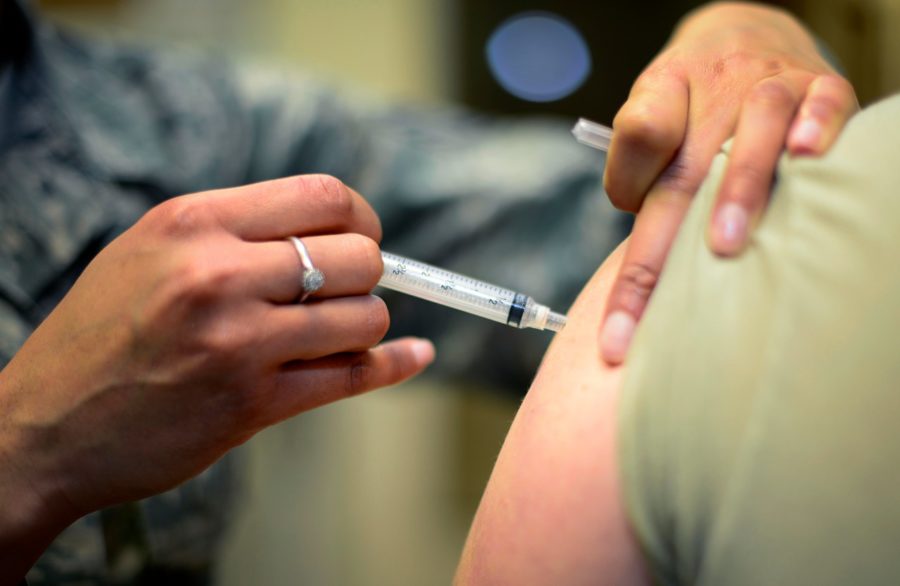How to fight the flu
Credit: Senior Airman Areca T. Wilson
One of the most effective ways of keeping the flu virus at bay is to get vaccinated.
March 6, 2018
Every year, the flu makes its comeback to the United States and sets in until the end of the season. One should do everything to avoid the flu, which, just like a neighbor slightly too intrusive, invites itself everywhere without warning. It remains to be seen how to prevent this inevitable illness.
Sure enough, this year, the flu has been more intense and widespread than the previous years. Even if the flu cannot be considered as an epidemic for the moment, it may happen soon. As reported by a Forbes article, the rate of hospitalization is 59.9 per 100,000 people after 18 weeks. In comparison, over the 2014-2015 season, the hospitalization rate reached this point after 25 weeks.
This year’s flu activity is especially high, with increasing medical visits for flu-like illnesses. According to a recent CDC report, 32 states experienced high influenza-like illnesses activity, including New Hampshire, Vermont, and Massachusetts. This potentially deadly sickness breaks out through several symptoms.
“With the flu, it comes on really fast,” said WHS Nurse Amy Schoeff. “You know you feel crummy for a couple of days, and then you feel sick. You wake up in the morning, and then [you feel] awful. Sometimes [flu starts with] fever, but not always, muscle ache and soreness, headache. Sometimes, not always, stuffy nose and simply feeling wiped out.”
To prevent the H3N2, this year’s foremost flu strain, adopting good healthcare routines is the best way to guard against the virus. CDC, the Center for Disease Control and Prevention, recommends to routinely wash hands with soap and water. If the former is not available, alcohol-based hand sanitizer is a good alternative. Also, the CDC advises to clean and disinfect surfaces and objects potentially contaminated by flu germs and recommends avoiding close contact with people affected by influenza.
“Don’t get around with people who are sick, because the flu spreads within six feet of talking, laughing, coughing,” said Schoeff.
Above all else, Schoeff says it is essential to get a flu shot, even if it may be less effective this season. If the year is good, the effectiveness of the vaccine generally varies from 40 to 60 percent. However, as several media outlets have reported, this season’s vaccine would be only ten to twenty percent effective.
“It’s never one hundred percent, but this one is a little bit less effective. I think the theory is that the virus has mutated,” said Schoeff.
In any case, the vaccine should prevent the illness from lingering on and worsening.
“Even if you get the flu, it [the vaccine] might shorten the duration and decrease the intensity,” said Schoeff.
Once sick with evident flu symptoms, it is essential to avoid aggravation and further contagion. Consequently, the CDC recommends staying home for at least 24 hours after the fever is gone except to get medical care, and to cover the nose and the mouth with a tissue when coughing or sneezing, and then discarding the tissue. The CDC also suggests avoiding touching the eyes, nose or mouth because that’s how germs proliferate.





![Last Wednesday, the Wayland School Committee gathered to discuss a number of topics regarding the health curriculum and Innovation Career Pathway course. Another large topic of conversation was the ways to potentially mitigate distracting cell phone usage. "These [phones] are going to distract your learning and social relationships," Superintendent David Fleishman said. "That's concrete right there."](https://waylandstudentpress.com/wp-content/uploads/2025/06/Screenshot-2025-06-04-at-9.49.31 PM-1200x886.png)



























![Troy Hoyt finishes the Boston Marathon, running for the Hoyt Foundation. T. Hoyt is the son of Hoyt Foundation CEO Russ Hoyt.
“[Running a marathon] might seem like a big thing, when it’s presented to you at first, but if you break it up and just keep telling yourself, “Yes, you can,” you can start chipping away at it. And before you know it, you’ll be running the whole 26 miles, and you won’t even think twice about it.” T. Hoyt said.](https://waylandstudentpress.com/wp-content/uploads/2025/04/C36E8761-1CBB-452E-9DF2-543EF7B1095E_1_105_c.jpeg)













































